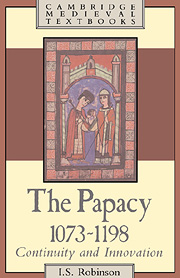Book contents
- Frontmatter
- Contents
- Preface
- List of abbreviations
- BIBLIOGRAPHICAL NOTE
- PART I THE PAPAL GOVERNMENT
- 1 Rome and the Patrimony of St Peter
- 2 The college of cardinals
- 3 Papal councils
- 4 Papal legates
- 5 Papal justice and papal legislation
- 6 The papacy, the religious orders and the episcopate
- 7 Papal finance
- PART II THE PAPACY AND THE SECULAR POWERS
- Appendix A list of popes, 1073–1198
- Index
5 - Papal justice and papal legislation
Published online by Cambridge University Press: 05 June 2012
- Frontmatter
- Contents
- Preface
- List of abbreviations
- BIBLIOGRAPHICAL NOTE
- PART I THE PAPAL GOVERNMENT
- 1 Rome and the Patrimony of St Peter
- 2 The college of cardinals
- 3 Papal councils
- 4 Papal legates
- 5 Papal justice and papal legislation
- 6 The papacy, the religious orders and the episcopate
- 7 Papal finance
- PART II THE PAPACY AND THE SECULAR POWERS
- Appendix A list of popes, 1073–1198
- Index
Summary
The whole Church throughout the world knows that the holy Roman church has the right of judging every church and that no one is permitted to dispute her judgement. Appeals are to be made to her from any part of the world but no one is allowed to appeal from her judgement. Nor do we omit the fact that the apostolic see has the power to absolve (without any synod taking place) those whom an unjust synod has condemned and to condemn (without a synod) those who should be condemned. This derives indisputably from her preeminence (principatus) which St Peter the apostle held and will always hold, according to the Lord's word.
This definition of the jurisdictional primacy of the Roman church is composed of sentences from a letter of Pope Gelasius I of 496. It first appeared in this edited form in the earliest canon law manual of the Gregorian reform, the Collection in 74 Titles, and was subsequently quoted by the influential canonists Bishop Anselm II of Lucca (1083) and Bishop Ivo of Chartres (1094/5), before being absorbed into the most important collection of our period, the Decretum of Master Gratian of Bologna (ca. 1140). The Gelasian text elaborated the ruling of the council of Sardica (343), the earliest statement of the Roman claim to appellate jurisdiction over the other churches: the Roman see was the court of appeal for all bishops and the pope's decision was final.
- Type
- Chapter
- Information
- The Papacy, 1073–1198Continuity and Innovation, pp. 179 - 208Publisher: Cambridge University PressPrint publication year: 1990



